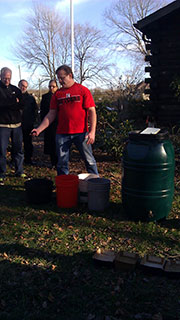
Once you have your soil test results, you may find that you need to add fertilizers and/or soil amendments to correct nutrient deficiencies. Synthetic fertilizers are not allowed in an organic program. Synthetic fertilizers differ from organic fertilizers in that most synthetic fertilizers have soluble nutrients that are immediately available for plant uptake. Natural organic fertilizers need to be broken down by the soil biological community before nutrients are slowly made available to plants. Soil microorganisms are active only once soil temperatures have increased to above 50º F and there is sufficient moisture.
Examples of soil practices that are prohibited in an organic land care program would be:
- Adding soil amendments and fertilizers without a soil test
- Using any synthetic fertilizer or soil amendment
- Using chemically treated wood, burlaps, stakes, and twines
- Using mulch made from ground-up tires
- Using newspaper with colored inks and inserts used to suppress weeds
- Using sewage sludge (biosolids, ex. milorganite) as a soil amendment
Follow the soil test recommendations for correcting soil pH and nutrient deficiencies. When applying fertilizers, remember that more is not better. Excess fertilizer applied to a landscape can pollute stormwater runoff and, ultimately, local streams and rivers.
Know the law on fertilizer applications in New Jersey. New Jersey's Fertilizer Law is the strictest in the nation and prohibits the type of fertilizer that can be applied as well as restricts fertilizer applications to specific times of the year. Be aware that many natural, organic fertilizers contain more phosphorus than nitrigen. These fertilizers should not be used as a nitrogen fertilizer otherwise too much phosphorus will be applied and post a water pollution risk.
Learn more about New Jersey's fertilizer law and how it may affect you.
Buyer Beware:
Fertilizers labeled as "organic" may still contain ingredients that are not permitted in an organic land care program such as sewage sludge, urea, and super phosphate. This is because fertilizer labels are regulated on a state-by-state basis and most states do not mandate that "organic" fertilizers have to comply with National Organic Program (NOP) standards. When buying an organic fertilizer, read the label carefully to make sure there are no ingredients that are prohibited. Ingredients that come from natural sources such as plant or animal by-products (i.e., fish, feather, or blood meal), rock powders, and seaweed would be permitted for use. Additional information for understanding organic fertilizers are listed in the resources section.

